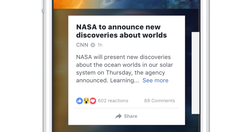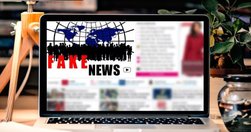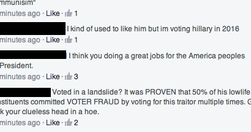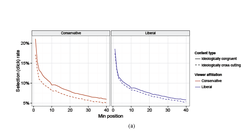Relevant Overviews
- Content Strategy
- Online Strategy
- Online Community Management
- Social Media Strategy
- Content Creation & Marketing
- Digital Transformation
- Fediverse
- Innovation Strategy
- Surveillance Capitalism, Social media and Polarisation (Overview)
- Disinformation in the US 2020 elections
- Communications Tactics
- Psychology
- Social Web
- Media
- Politics
- Communications Strategy
- Science&Technology
- Business

"Facebook quietly stopped recommending that people join online groups dealing with political or social issues", and will "assess when to lift them afterwards, but they are temporary." This part of the Facebook's AI plays a key role in pushing "people down a path of radicalization... groups reinforce like-minded views …
Summary of peer-reviewed research - “Understanding Echo Chambers and Filter Bubbles: The Impact of Social Media on Diversification and Partisan Shifts in News Consumption” - by its authors, who found:more time spent on Facebook, the more polarized their online news consumption becomes...Facebook usage is five times more polarizing for conservative…

“It’s so easy to feel you’re special or in on something.” - James Wolfe, 45, who was "introduced [to Qanon] by a friend to the idea in late 2017... [when he] was recently unemployed and recovering from a serious physical injury", and quickly "started spending as much as eight hours a day" before recovering "from QAnon aft…
In the realm of knowledge, monopoly and conformism are inseparable perils. The danger is that these firms will inadvertently use their dominance to squash diversity of opinion and taste. Concentration is followed by homogenization... news media ... have rushed to produce articles that will flourish on those platforms... a duplication of the news…

The more you engage with a particular kind of post, the more you will see its ilk... eventually constructs a small “in-group” cluster of Facebook friends and topics that dominate your feed... causes your behavior to change... reinforcing their in-group status… ... because “engagement” is the metric, Facebook inevitably selects for the shocking an…

a “Topics to Follow” box in the News Feed that lets you swipe through a range of themes... Tapping “Follow” brings you to a dedicated feed for that theme populated by a collection of Pages ... tap through to see all the Pages you’ll then see public posts from in your main feed... Facebook could expose people to contrarian views that might make the…

instead of highlighting a single news outlet when you click through to a Trending topic, Facebook will now show a carousel of the other most popular articles written about the subject by different publishers... that could backfire by showing you more biased sources than you’d normally read. Not every fact needs an “alternative” take.

The new right’s echo chamber is hermetically sealed, while the left’s is not.... Private platforms like Facebook are under no obligation to provide us a diverse worldview. If it is more profitable to ... isolate us in a bubble of ideologically comfortable information, they will.... build an aggregator where the algorithms can be reviewed by schola…

Facebook will start adding “related” articles from different publications underneath a news post about a trending topic in your News Feed.

to put the blame solely on the company is to overlook how people use the site, and how they themselves create a filter bubble effect through their actions.... Just as important as the algorithm is how people use the site and shape it around their own communications... people are actually exposed to a great deal of diversity through Facebook... But…

We know little about the amount of fake news an average citizen consumes, or how it fits into their overall news diet... What we found calls into question the severity of the fake news crisis.... We gathered data for both the real and fake news sites from comScore... First, the fake news audience is tiny compared to the real news audience–about 1…

But millions of people chose to skip the media ... and watch the speech live, via Facebook... greeted with a litany of comments and emoticon reactions, all colored by the point of view of the outlet broadcasting it...a live or real-time filter bubble, where a viewer’s perceptions of a live event are colored by the commentary that surrounds it.

as we jump to fix the fake news problem, we may end up destroying our best hope to break through our echo chambers... those bubbles, it turns out, are far from airtight... 15-25 percent of the people we connect to on social media, on average, come from across the political divide... the level of diversity we come across in real life homophily is…

A work in progress from an upcoming eponymous post. Another experiment with the enewsletter format: some initial thoughts on this seemingly intractable problem, with some of the source materials I’m studying.

Perfectly open communities always go sour. You need filters. Every functional community has them. And that’s where machine learning comes in... If you can detect trolls, you can protect the people they’re trolling by muting or putting a warning over the trolls’ posts... Twitter... already have a way of screening out porn. Why don’t they do the sam…

As Facebook attempted to capture the fast-moving energy of the news cycle from Twitter... it built a petri dish for confirmation bias... Here’s how... ‘Share’ Button ... encouraging people to share quickly and without much thought... “original sharing,” where people post their own photos, text updates... was declining..., content from celebritie…

Zuckerberg... suggested the real problem is that people by nature engage with content they like and find agreeable, and dismiss things they don’t agree with online as they would in real life... it needs to implement better features to help diversify the content we see... For such an influential platform ... it’s irresponsible for Facebook to give …
Segregated social universes, an industry moving from red states to the coasts, and mass media’s revenue decline: The disconnect between two realities shows no sign of abating... American political discourse in 2016 seemed to be running on two self-contained, never-overlapping sets of information... today’s media ecosystem encourage that separatio…

While our experience with political Facebook posts suggests, anecdotally, that the thrust of the story is correct, we cannot confirm the authenticity of the study... Our efforts to reach Rantic before publication were unsuccessful, and Wired has since retracted its story.

“I am actively searching through Facebook for people celebrating the Brexit leave victory,” ... to no avail. He called on his friends in the technology industry to act on this ‘echo-chamber problem’.... Why are they making the demand of social media companies — and not news organisations?...how we see technology now: both as something separate fro…
This isn’t the first time I’ve covered the impact of social media on news; technologies like augmented reality; and the impact of both on society. It is the first time these Top3ics have meshed so perfectly in one month.

To demonstrate how reality may differ for different Facebook users, The Wall Street Journal created two feeds, one “blue” and the other “red.” If a source appears in the red feed, a majority of the articles shared from the source were classified as “very conservatively aligned” in a large 2015 Facebook study. For the blue feed, a majority of each …

The filter bubble... has evolved. Algorithms, network effects, and zero-cost publishing are enabling crackpot theories to go viral... impacting the decisions of policy makers and shaping public opinion, whether they are verified or not... Facebook's news feed ... tailored just to us ... to keep us interested and happy... drives engagement and mor…
Ironically, with the widening of (national) news choices that the Internet has spawned, we’re depending on fewer pipelines of news. It’s a narrowing of the filter funnel...t as troubling as the filter bubbles that used to occupy our concerns, but likely more potent. As those pipelines narrow, necessarily, the decision on what is news, and what is …

Study shows political discussions are ruining Facebook and friendships... users who try to talk about politics on Facebook are often surprised by the political opinions of their acquaintances... a diverse set of opinions among a user's friends makes everyone want to speak up less...Facebook has a low threshold for “friending” ... can bridge togeth…

It’s easy to underestimate how much of the media you’ve consumed was shaped by the “like” button... whispers suggest that the company is not, in fact, launching a simple “dislike” button, but something that conveys empathy.... it’s safe to say there will be consequences... When Facebook broadens the scope of the emotional-response buttons, t…
Blogging has never been easier but getting read has never been harder... The problem isn't freedom or openness but distribution... you might post it on Facebook or Google Plus. Your friends might see it ... (though this is largely random) and they might share it ... You might post it on LinkedIn and your network might see it ... and LinkedIn migh…

"usually, researchers are at a pains to highlight their findings. This one buries them as deep as it could, using a mix of convoluted language and irrelevant comparisons... this study is not about all of Facebook users, despite language ... that’s quite misleading: “Finally, we conclusively establish that on average in the context of Facebook…”…

Great takedown of the flaws and bad framing of the Facebook filter bubble study in Science: "Alarm bells are ringing for me. The tobacco industry might once have funded a study that says that smoking is less dangerous than coal mining, but here we have a study about coal miners smoking... the article’s strange comparison between “individual…

FiltreBubble author on Facebook's study in Science: "Facebook’s data science team has put part of the “filter bubble” theory to the test ... Upshot: here is a real and scientifically significant “filter bubble effect” — the Facebook news feed algorithm in particular will tend to amplify news that your political compadres favor... For self-de…
Relevant Overviews
- Content Strategy
- Online Strategy
- Online Community Management
- Social Media Strategy
- Content Creation & Marketing
- Digital Transformation
- Fediverse
- Innovation Strategy
- Surveillance Capitalism, Social media and Polarisation (Overview)
- Disinformation in the US 2020 elections
- Communications Tactics
- Psychology
- Social Web
- Media
- Politics
- Communications Strategy
- Science&Technology
- Business